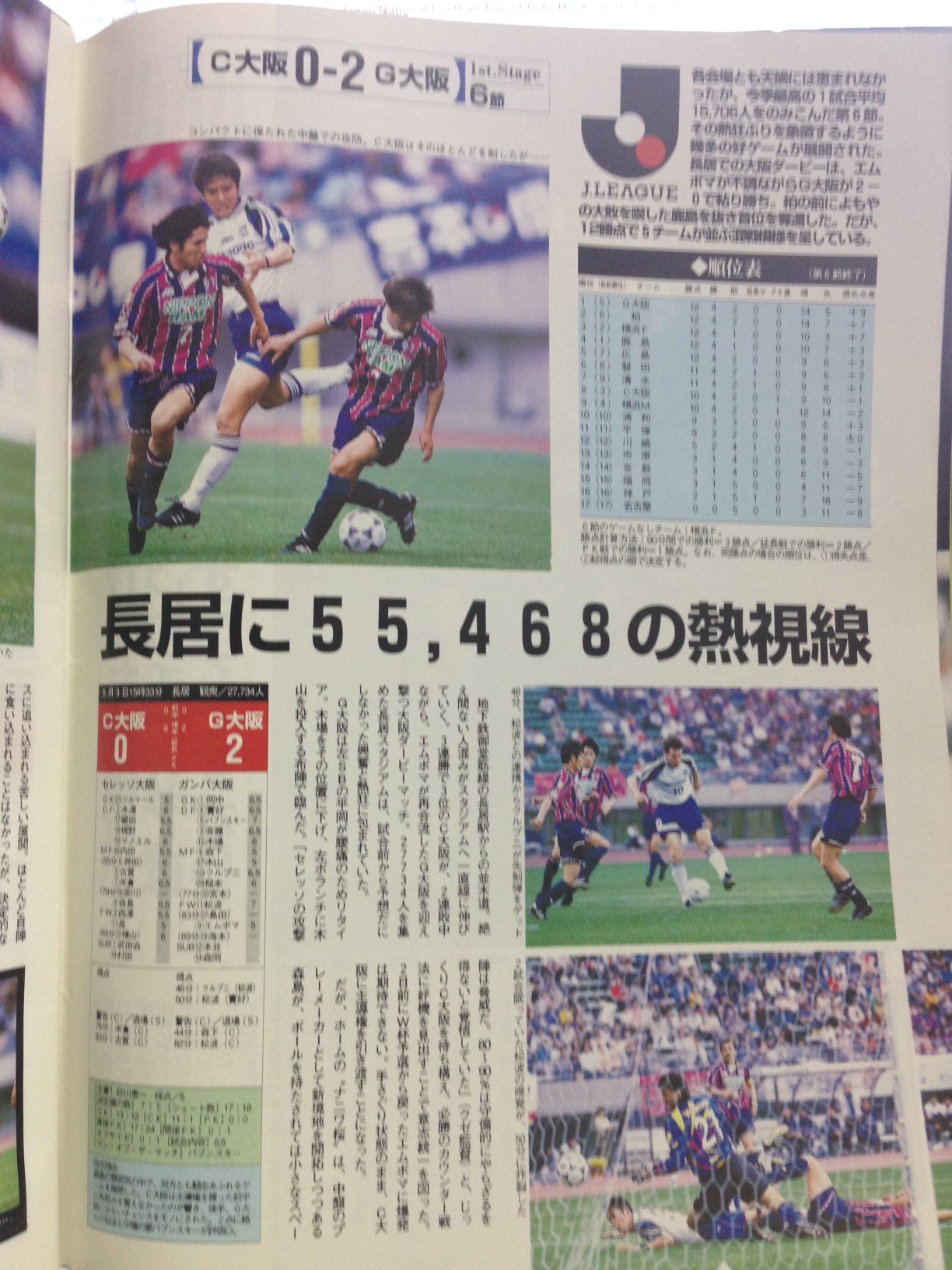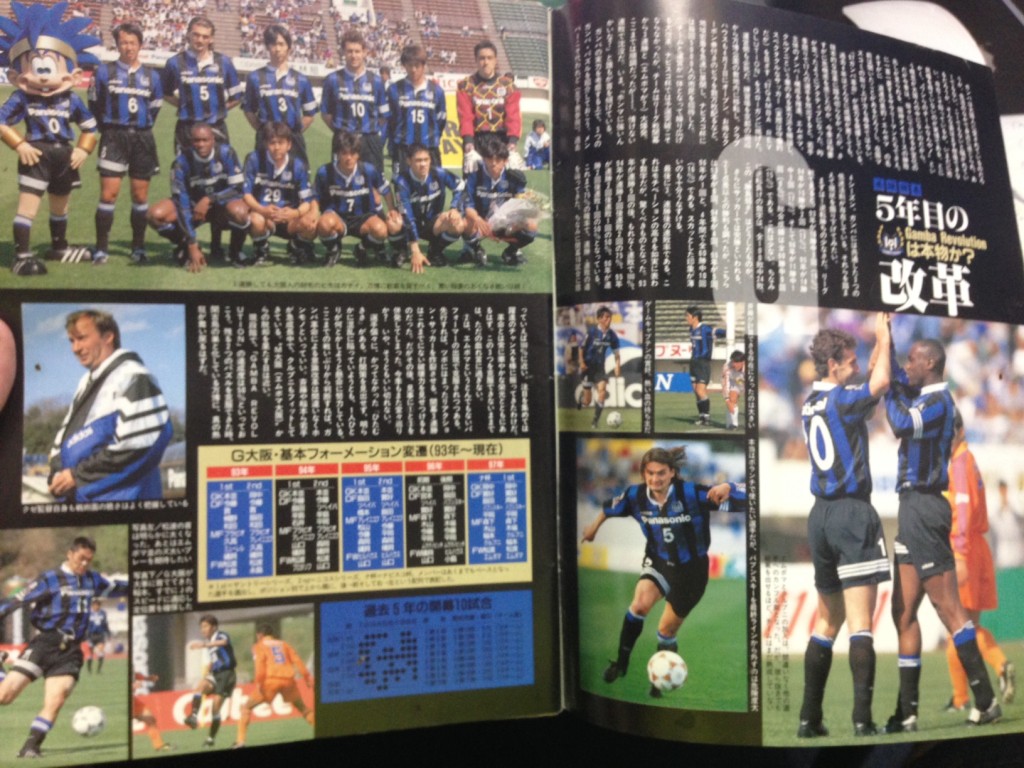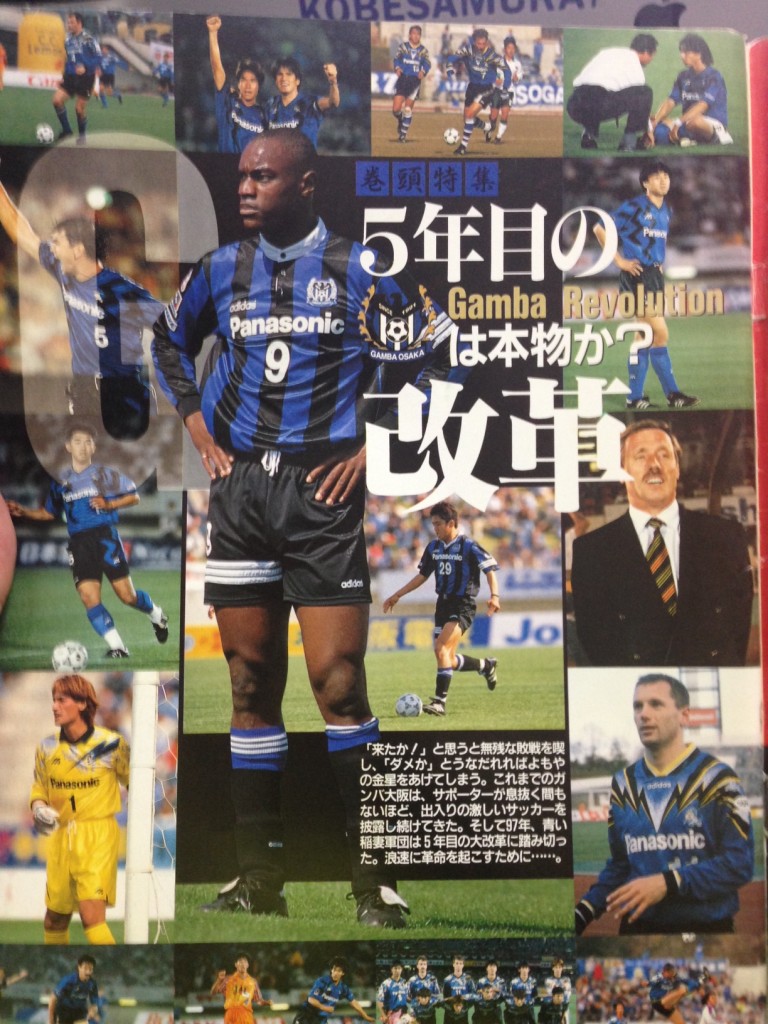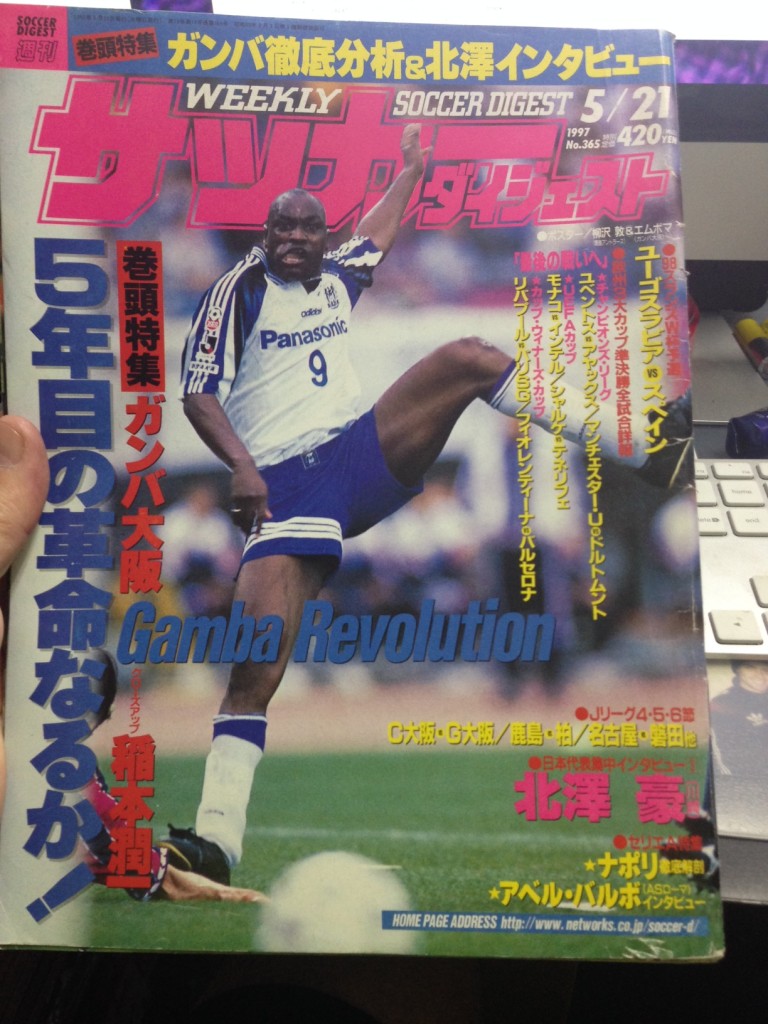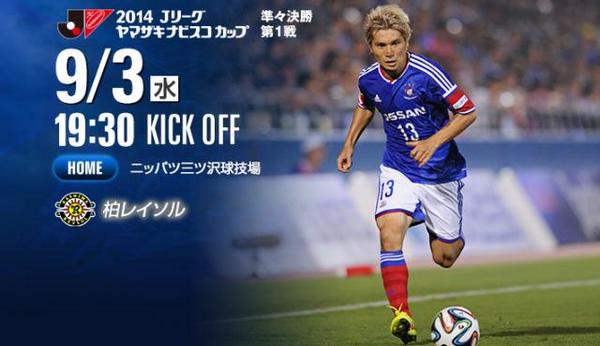https://archive.org/details/TheJ-talkPodcast-2014J1Matchday26
Tag Archives: jleague
J1 / J2 – a Big Weekend – all the fixtures!
J1
Saturday – September 27th
Yokohama F•Marinos v Ventforet Kofu
Sanfrecce Hiroshima v Vissel Kobe
FC Tokyo v Kashiwa Reysol
Gamba Osaka v Sagan Tosu
Omiya Ardija v Shimizu S-Pulse
Cerezo Osaka v Urawa Reds
Kawasaki Frontale v Vegalta Sendai
Tokushima Vortis v Kashima Antlers
Nagoya Grampus v Albirex Niigata
J2
Sunday – September 28th
Roasso Kumamoto v Giravanz Kitakyushu
Oita Trinita v V-Varen Nagasaki
Fagiano Okayama v Mito Hollyhock
Kataller Toyama v Avispa Fukuoka
Matsumoto Yamaga v Consadole Sapporo
Jubilo Iwata v Ehime FC
Montedio Yamagata v Kamatamare Sanuki
Thespakusatsu Gunma v Tochigi SC
Kyoto Sanga v Yokohama FC
JEF United Chiba v Tokyo Verdy
Shonan Bellmare v FC Gifu
Cerezo Osaka 0-2 Gamba Osaka (1997 Osaka Derby)
Yes it was the Osaka Derby and Gamba won 2-0… so no change from this one in 1997 … except there were 55,000+ in attendance!
Incidentally this Gamba team pictured below – although obviously not the same game as the article (this picture is Banpaku) is quite amazing because, of the eleven players pictured many are still in the game, or in touch – hello Patrick Mboma (and Hans Gillhaus also elsewhere in this article pics)…
Back row L to R – Morishita was coach at Jubilo recently and now at Kyoto I believe, Boban Babunski is a friend on Facebook, Daisuke Saito is on my speed dial (and just finished at JEF United),… no.15 is Masao Kiba, who commentated on the Osaka derby yesterday.
I also still see GK Okazaki at Gamba games now and again ..
Patrick Mboma is on the left of front row, no.29 is Inamoto (now at Frontale), no.7 Naoki Hiraoka also a Facebook friend, Matsunami is coach at Gainare Tottori and Saneyoshi followed Akira Nishino to Nagoya Grampus … a great team and still influential in the game today.
J2 Sunday September 14th 2014
Japan 4-1 Kuwait as their Asian Games Commences
Japan routs Kuwait in Asian Games opener
Here’s the Kyodo News take on the match:
INCHEON, SOUTH KOREA – Japan launched its Asian Games campaign with victory on Sunday, the defending champion defeating Kuwait 4-1 in the men’s soccer competition.
Five days ahead of the opening ceremony of the 17th Games, Albirex Niigata forward Musashi Suzuki struck on either side of halftime for Japan, which was also boosted by a goal each from captain Ryota Oshima and Takuya Iwanami.
Japan’s next game is on Wednesday against Iraq. Japan beat the United Arab Emirates 1-0 in the final to snare gold four years ago in Guangzhou, China.
Nadeshiko Japan, who also won the title in 2010 alongside the men, play China on Monday in their first game of the competition.
Both teams came out cautiously for the opening half at Incheon Football Stadium, where the first shot on target by either side in the 43rd minute led to the first goal of the game.
Oshima, despite being surrounded by three defenders, found his way onto the end of a lob into the box before the Kawasaki Frontale midfielder hit the back of the net.
Kuwait came within a hair of equalizing through its captain in injury time, but Jubilo Iwata’s Ayumi Niekawa made a fine save from Alsanea Sami from point-blank range to keep Japan ahead going into the break.
Makoto Teguramori’s men got off to a fast start in the second half when from a 50th-minute corner, Suzuki pounced on a ball headed across the face of goal by Kashima Antlers’ Naomichi Ueda.
The Kuwaitis pulled within one 20 minutes later through Najaf Yousef to give themselves a chance of stealing a point off the holders, after Iwanami cleared off the line.
But Iwanami himself re-established Japan’s two-goal lead from close range in the 74th minute, and Suzuki put the game out of Kuwait’s reach eight minutes from time with his second of the evening thanks to the assistance of Shoya Nakajima.
“I’m glad I could score,” said Suzuki. “We didn’t start very well but gradually started to control the pace of the game. We attacked really well in the second half.”
“If we play like we did in the second half against Iraq I think we can do well. We need to get proper rest for the next two days and get prepared.”
The New J-Talk Podcast with Ben Maxwell and guest … JSoccer’s Alan-chan!
Javier Aguirre interview
From FIFA.com
In coaching terms, Javier Aguirre is a genuine pioneer. In 2002, when handed the reins at La Liga side Osasuna, he became the first Mexican-born coach to lead a European top-flight team and now, 12 years on, his career has taken an even more unexpected twist.
After following his stint at Osasuna with spells in the hotseats of Atletico Madrid, Mexico, Zaragoza and Espanyol, the 55-year-old supremo is now relishing his latest challenge at the helm of Japan after his appointment in late July this year. Exhibiting his customary sense of humour yet without downplaying the significance of the task in hand, embodied by a 2-0 defeat to Uruguay in his opening game, El Vasco Aguirre spoke exclusively to FIFA.com.
FIFA.com: Tell us about your start to life at the helm of the Samurai Blue?
Javier Aguirre: I’m just getting a feel for the role, particularly in terms of learning about the local-based players. We’ve got 19 players based in Europe, but we need to get to know the J-League better. We’ve not had much time to do so yet, but my team and I are working on it. Our first squad selection had to be made against the clock, because the “Europeans” have to be given 15 days’ notice, so time was clearly short. Even so, I think we’re on the right track.
Had you been to Japan before? What have been your early impressions since moving there?
I’d been here several times before, the most significant visit was, of course, when I was here with Mexico at the 2002 World Cup. A lot has changed since then though. Before it was a struggle to find foreign products or people who understood and spoke English, but nowadays you can go about your life like in any other major capital city in the world. As long as you make a bit of effort yourself to adapt, you won’t have a problem. We’re very happy and we’re getting to know the culture here, getting used to the pace of life… When you come to a new country you’re the one that has to adapt, not the other way around.
You’re the first Mexican head coach to take charge of a non-CONCACAF nation. How did your appointment as Japan boss come about?
Contact was first made in 2010. After that World Cup, the Japanese FA sought me out, but at that point my youngest son was still at school, so we couldn’t leave Spain. Then, four years later, they revived their interest. I’d already told Espanyol I wouldn’t be staying. Signing a new contract would have been difficult because there was barely any money to strengthen the squad, so I decided to step aside. I had a few offers to stay in Europe, but I wanted to broaden my horizons – and that’s when Japan came back on the scene. I liked the look of their project, I talked it over with my wife and it seemed a good idea to aim for a fifth World Cup appearance [Editor’s note: Aguirre played for Mexico at Mexico 1986, was El Tri’s assistant coach at France 1998 and head coach at Korea/Japan 2002 and South Africa 2010].
What was it about Japan project that impressed you and what areas do you feel need work?
There’s strong financial backing [behind the project], the domestic league is solid and there’s a good number of players at European clubs. On the other hand though, after watching Japanese league games, I felt that some almost looked like friendly matches – like testimonials. I felt they were missing a touch of picardía (street smartness, cunning). The ball gets kicked out of play eight or ten times because a player has gone down; play is stopped ten or 12 times to drink water – and that’s reflected at national-team level. I’m not saying it’s right or wrong, it’s just different to what I’m used to in Mexico or Spain, where they play every minute like it’s life or death.
How do you instil that picardía?
It’s not easy. Less and less football is played out on the street – back in my day we learned the game in between dodging cars, or in the schoolyard, whereas now the game’s taught more rigidly. But you have to try and add a touch of picardía, while staying within the rules of course. I’m talking about the players not giving up lost causes and knowing how to ‘manage the result’. I don’t mean cheating or kicking people, but just making sure your opponents know you’re really in the game.
Funnily enough, Mexico coach Miguel Herrera said something similar after their Round of 16 defeat to the Netherlands at Brazil 2014…
Sometimes it’s what you need! I’m talking about when you’re winning in the 85th minute, you go and retrieve the ball more slowly, you take short corners, you tie your laces… That way you use up valuable seconds without breaking the rules. What can the ref do about it? You need to have that picardía, while of course staying within the rules.
Culturally speaking, what has struck you most since you came to Japan?
The deep respect shown towards people. Even in press conferences, the level of order is impeccable. The respect shown towards nature, towards your fellow man. It’s really striking how friendly people are to you. Tokyo is a metropolis with millions of inhabitants and so you’d imagine it to be crazy, but the quality of life is incredible. Everything is kept really clean and it’s very orderly, which is a big help when it comes to progress. We feel very at ease here. It’s true that there’s a language barrier, but we’ll try and ease that by learning a few words and being able to understand the basics. I’ve come here with my wife and one of my children and he’s helping me with the team.
Speaking of press conferences, can you tell us a little about your early dealings with the press?
Everyone’s been very polite so far. There’s a lot of expectation, people are keen for us to start playing some games. They see me as a gutsy, battle-hardened coach, which I’m pleased about. And we will fight our corner, while trying to play nice football at the same time. We want to build a team that can compete, wherever we’re playing.
How long is your contract for?
It’s for two years, with an option to extend for two more. There’ll be an evaluation [after the initial period], but everyone is aiming for us to still be in place to take the team into Russia 2018 – that’s our main objective.
Interestingly, this is the first time you’ve taken charge of a national squad right at the start of a four-year World Cup cycle…
That’s something I’m very happy about. In the modern game it’s very difficult to gain any kind of job stability: whatever your contract, if results go against you there are no guarantees. The two times I took Mexico to the World Cup I was handed the role with very little time to work with, so it was more about patching up holes in the team and trying to get enough points for us to qualify. Now I’ve finally got the chance to start a cycle from the beginning. Perhaps it’s my age, but I feel this is the right move for me. After spending over ten seasons coaching in Spain, working with a club team every day can get very gruelling. Working with a national team is just as demanding, but without the intensity of matches every weekend.
Changing the subject a little, what was your verdict on Mexico’s performance at Brazil 2014? What do they need to do to reach the latter stages of the World Cup?
Overall, I thought Mexico did very well. The credit must go to Miguel Herrera, who assembled a very well-drilled and competitive team in just four or five months. We’ve got past the first phase for the last six World Cups now, a feat only matched by Germany and Brazil. The Liga MX has improved a lot, it’s well-run, its infrastructure is phenomenal and more and more players are earning moves to Europe. If Miguel can survive in the job these next four years and people respect the work he’s doing, I think that Mexico can take the next step. We’re getting closer all the time. Perhaps we might also need to hope for a favourable draw, that little dose of good luck you always need at major competitions.
You still refer to Mexico as ‘we’. Would you enjoy tackling El Tri with Japan?
(Laughs) I think it’s unlikely to happen! Fingers crossed we can cross paths at the Confederations Cup in 2017 [with Mexico as CONCACAF Gold Cup winners and Japan as AFC Asian Cup champions]!
One last question, is there any message you’d like to send to Japan supporters?
Just that they’ll be proud of their team: I promise them that they’ll fight hard, wherever they’re playing. Our plan is to play good football and, of course, to win.
Aguirre to try to give even more squad players a chance against Venezuela.
Japan men’s national team coach Javier Aguirre revealed his intention at a news conference at International Stadium Yokohama on 8th September that he would make some changes in his starting squad for their second game of the 2014 Kirin Challenge Cup against Venezuela.
The new boss played four players who were called up for the national team for the first time in their first game against Uruguay that was played three days before, but he said that he wanted to continue to check on his players’ skill-sets by using other men who did not see action in the Uruguay match. ”I want to see all of our players and we will substitute five players for tomorrow. Of course, we may make them during the match,” Aguirre said. ”In the early stage of the new team, we want to observe it first to determine what we want to do with it. Establishing the style for the team is more important than anything,” he added.
Aguirre said that he would look for a win, checking on his players, while he would also ask his squad to not repeat the same mistakes they made in their loss in the first game. ”We want to win this match. We lost the other day and just want a better result this time,” the Mexican said. Japan closed their practice to the media, except for the first 15 minutes of it, and elaborately worked on their final tune-ups under drizzling rains.
Japan and Venezuela have played twice and drew in both, including one that was played in August of two years ago. The South American side will miss forward Salomon Rondon (Zenit), who was ejected in the Korea match.
The contest will kick off at 7:20 p.m. at International Stadium Yokohama.
Comment on the “Racism” Incident at F•Marinos v Frontale
On Recent Events…
by jamiemc60
Despite a return to form on the pitch in recent weeks, it’s off the field issues that have earned the headlines for our beloved club in recent weeks. Of course, as a football fan it’s never nice to see your club on the front pages rather than the back pages, but as a foreign supporters group the challenges we have faced in recent weeks have been particularly concerning. As such, we feel it is appropriate to both inform our readers and offer an opinion on recent events. This post will be separated into two parts. In part 1, for those who have not yet learned of the incident in question, we will explain exactly what has happened and the circumstances around it. In part 2 we will offer our opinion on events.
Part 1
Firstly, we would like to note that the club or the fans of our regional rivals Kawasaki Frontale were in no way to blame for recent events, but we do feel it’s appropriate to put into context the rivalry between our clubs.
In recent years, ties against Frontale have become increasingly heated. In December of last year, Kawasaki defeated us on the final day of the season to deny us our first league championship in a decade. In May, we returned to Todoroki, the home of Frontale to face them in the final J.League fixture before the league took a two month break for the World Cup. At this game, a Frontale fan laid a scarf over a banner of club legend Naoki Matsuda, which had been positioned in front of the home fans due to a large traveling support. This act prompted a furious response from our fans, who moved towards the home fans and demanded the scarf be removed immediately.
In most other leagues, such actions in a local rivalry would be standard fare. As I write this article from Glasgow, Scotland, such an incident at a local derby wouldn’t gather a single line in a newspaper, with players, fans, managers and even politicians wading into the inevitable controversy that surrounds each Celtic and Rangers game that takes place. However, context is important here, and the J.League is not a league that has suffered from hooliganism or misbehaviour from fans in its 20 year history. The matchday experience of fans in Japan is second to none. Stadiums are family-friendly, alcohol is readily available at reasonable cost inside the stadium, and there is little restriction on what fans can bring into the stadium overall. This tremendous match day experience comes at a cost; with the league and clubs’ sensitivity to public relations serving to sanitise the experience of fans who want to participate in ‘banter’ or to poke fun at their rivals. Acts seen as stoking rivalry are frowned upon and deemed ‘provocation’. For example, after Shimizu S-Pulse fans teased their relegation-doomed local rivals Jubilo Iwata in the Shizuoka Derby last year, the club reacted by banning songs and banners whilst the players were not on the pitch, as well as prohibiting them from ‘over-celebrating’ victories.
In March of this year, Urawa Reds, one of the most popular clubs in Japan, were forced to play a home game behind closed doors after fans displayed a banner reading ‘Japanese Only’ at the entrance to the section behind the goal. The Saitama stadium was closed for their home game against S-Pulse, and J.League president Mitsuru Mirai accused the club of “damaging the brand of not just the J.League, but of the entire Japanese football community.” Whilst instances of racism have occurred sporadically in the league in the past, this incident almost went viral. Images of the banner appeared on Twitter, international news outlets such as the BBC and Eurosport covered the story and the response of fans in the league was almost unanimous: racism would not be tolerated in the J.League. The supporters group responsible for the banner was disbanded, and the president of the club apologised for the incident and the slow response of club officials who had bizarrely waited to seek permission from the owner of the banner before removing it from the stadium. Yokohama F•Marinos fans, for their part, spoke out against racism at their next match. Fans Tweeted us pictures of banners they had created and put them out for display at the next available opportunity.
Six months on from these events, and Kawasaki Frontale were back in town. Due to Nissan stadium playing host to a national school sports event, the tie was to be held at Mitsuzawa, our second stadium with an attendance of around 16000. If recent ties held at the larger Nissan stadium are anything to go by, this game could have sold-out twice over. Fans packed in to the venue and a full-stadium ‘tifo’ display reading ‘YOKOHAMA’ was displayed prior to kick-off. The match was a heated affair, with Kawasaki having a man sent off in the first half. Throughout the match tensions ran high and the Kawasaki players were relentlessly booed when they took possession and as they approached the corners. Our new boy Rafinha was lucky to stay on the field after apparently shoving the referee out of the way in an attempt to get to Frontale defender Jeci after a poor tackle from the Brazilian. The game finished with a 2-0 victory, our second win over our rivals this year and one of our best performances so far this season. As the dust settled, however, our performance on the field would be overshadowed by the actions of a fan in the stands.
Similarly to the Urawa incident in February, videos and images began to circulate on Twitter shortly after the match showing a Yokohama F•Marinos supporter waving a banana at Frontale’s Brazilian attacker Renato.
With club officials viewing the incident, swift action was taken. The perpetrator was taken aside after the game and asked to explain himself. Whilst he denied his actions were racist, the club took the decision to ban him indefinitely. President Kaetsu described the incident as, “Unforgivable”, and even took the step of apologising profusely for the incident.
After several days deliberating, the J.League handed down a punishment to the club, a fine of 5 million yen. League President Mitsui Murai declared that, “The club dealt with the case appropriately but we did not feel they were doing enough to raise awareness, as is their responsibility.” As such, at the weekend following the incident when we faced Vegalta Sendai, there were no drums, no ultras and no banners. Fans will participate in anti-racism educational events before taking their place behind the goal once more. The particular supporters group that the perpetrator was a member of (easily identified by their distinctive black shirts) have been disbanded and will not be welcome at any of the remaining matches this season. The club has also asked for a general toning down of the booing during player announcements of visiting clubs, and in particular a cooling down of provocative acts towards Kawasaki Frontale on social media.
Part 2
We at Tricolore Pride are deeply disappointed with the racist incident that took place at Mitsuzawa recently. We fully accept the decision of the J.League to punish the club in this instance, however we feel we are in as good a position as anyone to offer an insight in to the Yokohama F•Marinos support on this particular issue.
Whilst there were Tricolore Pride members attending the game on that particular evening, none of us were in the vicinity of the incident that took place. Aside from the racist actions of the individual himself, those sitting in the immediate area surrounding him must also accept some responsibility. Self-policing is an important part of any event in which large groups amass. The failure of those around the perpetrator to intervene is of great disappointment.
Only the perpetrator himself truly knows his opinion on racism, however it is obvious that he did not have the sense to know that such a provocative act was not a legitimate way to act at a football match. Education is the key in eradicating racism from both football and society as a whole. It is easy to simply throw a fine at a club and move on, but we commend the J.League for recognising this is not a long-term solution and for indicating a desire to see anti-racism training carried out by fans. We would hope that the fan in question grows to learn from his mistakes and will eventually see the error of his ways.
In the past year alone, we have hosted guests from the following nations at home games: India, the Netherlands, Zambia, Australia, Canada, Scotland, Tunisia, the Philippines, Italy and England. In that time, we have never received anything other than a warm welcome from, what we believe, are the best fans in the country. Fan group leaders have reached out to us, we have been given gifts, shared beers with and chanted alongside many fans. In our experience, race is inconsequential; when you don your jersey, you’re a Yokohama F•Marinos fan and nothing else.
On September 13th, we will face Nagoya Grampus at the Nissan Stadium. On that day, most of the Tricolore Pride blog members will be in the stadium, with Tony and Jamie flying in from Australia and Scotland respectively to see the team play. Yokohama F•Marinos truly are an international club, and, as our success on the field and popularity increases, our fan base is becoming increasingly international in turn. We will continue to encourage friends & guests from all over the world to attend home matches with us, without fear of racism or discrimination in any form.
Please join us in supporting the team to another victory against Nagoya Grampus.
We are Marinos.
Tricolore Pride
Open Letter to Shinji Kagawa
This is doing the rounds on the “web”. The only credit I could find is at the bottom of the page. I like this, it’s not mine – if anyone knows who wrote it I’d be very happy to credit (and use their writings in the future!!).
Hello Shinji,
I called it destiny when you arrived at Manchester United. I call it injustice when you have left just two years later.
Related
Every United fan was genuinely excited when you arrived. Having watched you tear it up for Dortmund, we were sure we had signed a world class player who would transform the club.
You were going to be our number 10. United had been famous for wing play, crosses and mainly the 4-4-2. We believed that you will bring about the modernization of the club, change the way we played. We were licking our lips at the thought of you and Rooney linking up.
I still vividly remember watching the first game of the 2012-13 season against Everton. On a night when everyone else struggled, you caught the eye by nonchalantly putting Javier Hernandez through on goal twice. But you were overshadowed by the (non) contributions of one Mr Robin van Persie, a trend which had continued till date and had finally resulted in your departure.
Over the course of the next two years, the number of games you started in your favoured position are just a handful. Gross injustice. The left wing was where you got stuck and that shackled your creativity.
In hindsight, the second season would perhaps have been better. Wayne Rooney may have left and you may well have made the number 10 your own, but all that went down the drain when David Moyes arrived. It was silly to expect a manager who likes a Tim Cahill/Fellaini type of number 10 to understand and even think of playing you. He played you there for a game and half and was rewarded with the best football under his tenure – against Bayer Leverkusen and Swansea.
Come the January transfer window, the club needed a ‘statement signing’ and on came Juan Mata to push you further down the pecking order. There were a few games where you both combined well, but that was just a flash in the pan.
You are a classic example of how things are not so straightforward at big clubs like United. Having talent isn’t enough. Fate. Destiny. Luck. Lot of factors kick in and agonisingly for you and the fans, you did not have those factors going for you.
Or perhaps it was just tactical. Maybe managers did not see your fast one touch pass & move based style fit in with the slower playing style of United. It was disheartening to see mediocre players get chance after chance while you were relegated to the bench. But for two years, no matter how much you were mistreated, there were neither any complaint nor any whining. You have always given your best and fans will always remember that with gratitude.
Some dreams are never fulfilled. Some goals are never fulfilled. Some journeys do not reach their destination. All we are left with is thoughts about how well it could have gone and regrets about how badly it has gone.
You have gone back to a place where everyone adores you. Where the coach knows how to get the best of you. We are all happy for you as your talents will be on show again.
On behalf of Manchester United and its fans, I wish you all the very best for your second innings at Borussia Dortmund. I will continue to follow your career closely. I hope that you make us regret selling you.
Regards,
A Manchester United fan and Shinji Kagawa admirer.
